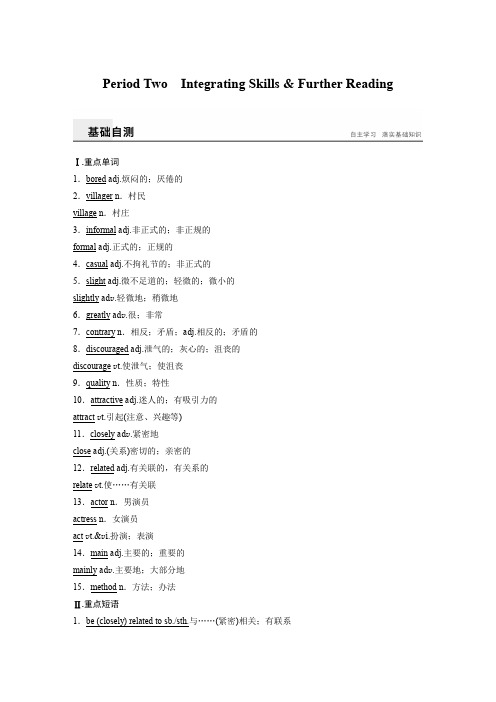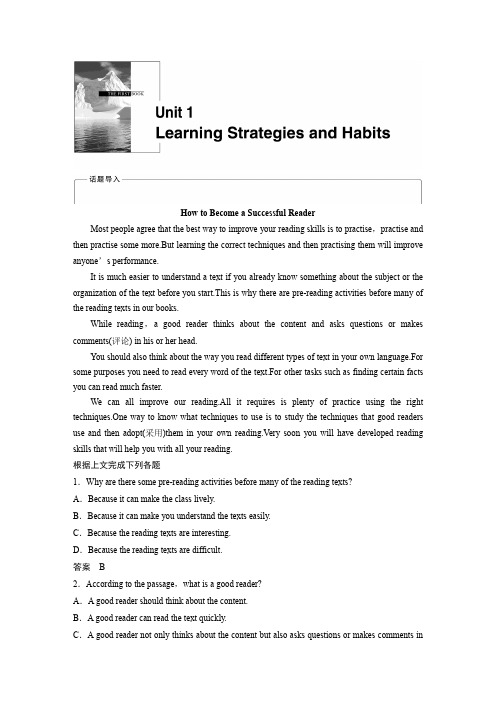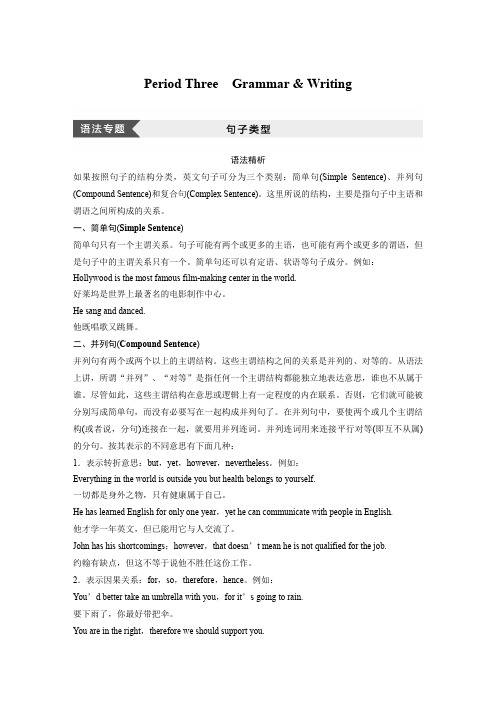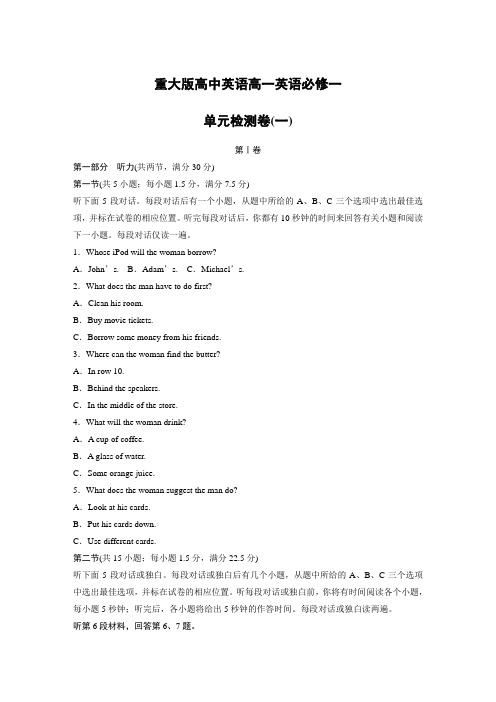重大版英语必修一配套文档:Unit 1 Period Three 含答案
重大版英语必修一配套文档:Unit 3 Period Three 含答案

Period Three Grammar & Writing语法精析一、概念直接引述别人的原话,放在引号内,被引用的部分称作直接引语(The Direct Speech);用自己的话转述别人的话,不用引号,被转述的部分称作间接引语(The Indirect Speech)。
间接引语在句子结构上是复合句的宾语从句。
二、规则英语中,将直接引语变为间接引语时要注意:语序、主语、时态、人称代词、物主代词、指示代词、时间状语和地点状语等发生变化。
1.陈述句直接引语是陈述句变为间接引语时,首先使用that引导,口语中that可以省略;主句谓语如果是said to...须改为told;其他作下列变化:(1)人称变化:遵循“一从主,二从宾,第三人称不更新”的原则。
①“一从主”,即在直接引语变为间接引语时,如果从句中主语是第一人称或被第一人称所修饰,从句中的人称要按主句主语的人称进行变化。
“I have already done my homework,” she told me.→She told me that she had already done her homework.②“二从宾”,即在直接引语变为间接引语时,若从句中的主语或宾语是第二人称或被第二人称所修饰,从句中的人称应与主句中宾语的人称一致。
Mary said to me,“Your mother is going to the party the day after tomorrow.”→Mary told me that my mother was going to the party in two days’ time.③“第三人称不更新”,即在直接引语变为间接引语时,从句中的第三人称不需要变化。
Mr.Smith said,“Robert is a good worker.”→ Mr.Smith said that Robert was a good worker.[即时跟踪1]单句改错(1)She said that I would go there that evening.I→she(2)He said that my family had been there for many years.my→his(3)He asked me how your mother was then.your→my(2)时态变化:如果主句谓语动词(即直接引语前面或后面的动词)是过去时态,直接引语变为间接引语时,时态必须和主句的过去形式一致。
重大版英语必修一配套文档:单元检测卷(二) 含答案

单元检测卷(二)第Ⅰ卷第一部分听力(共两节,满分30分)第一节(共5小题;每小题1.5分,满分7.5分)听下面5段对话。
每段对话后有一个小题,从题中所给的A、B、C三个选项中选出最佳选项,并标在试卷的相应位置。
听完每段对话后,你都有10秒钟的时间来回答有关小题和阅读下一小题。
每段对话仅读一遍。
1.When are they going to leave?A.At 3:15. B.At 4:15. C.At 2:45.2.What is Joy Bush?A.A computer maker.B.A book seller.C.A writer.3.What does the woman say about Susan?A.She hasn’t gone camping for weeks.B.She likes long camping trips.C.It takes her a long time to plan her camping.4.What does the man mean?A.He lets her go away.B.He will get closer to her.C.He can hear her very well.5.What are they talking about?A.Christmas tree.B.Christmas dinner.C.Christmas gifts.第二节(共15小题;每小题1.5分,满分22.5分)听下面5段对话或独白。
每段对话或独白后有几个小题,从题中所给的A、B、C三个选项中选出最佳选项,并标在试卷的相应位置。
听每段对话或独白前,你将有时间阅读各个小题,每小题5秒钟;听完后,各小题将给出5秒钟的作答时间。
每段对话或独白读两遍。
听第6段材料,回答第6、7题。
6.Where is the bus when they are talking?A.On the way to the People’s Square.B.At the People’s Square.C.At the bus stop.7.How will the man recognize the People’s Square?A.Watch for the big statue.B.Watch for it himself.C.The woman will tell him.8.What can we learn from the talk?A.The man took the bus by mistake.B.It was the first time for the man to the People’s Square.C.The bus wasn’t crowded at all.听第7段材料,回答第9至11题。
2016-2017学年重大版英语必修一配套文档:Unit 3 Period Two 含答案

Period Two Integrating Skills & Further ReadingⅠ.重点单词1.bored adj.烦闷的;厌倦的2.villager n.村民village n.村庄3.informal adj.非正式的;非正规的formal adj.正式的;正规的4.casual adj.不拘礼节的;非正式的5.slight adj.微不足道的;轻微的;微小的slightly ad v.轻微地;稍微地6.greatly ad v.很;非常7.contrary n.相反;矛盾;adj.相反的;矛盾的8.discouraged adj.泄气的;灰心的;沮丧的discourage v t.使泄气;使沮丧9.quality n.性质;特性10.attractive adj.迷人的;有吸引力的attract v t.引起(注意、兴趣等)11.closely ad v.紧密地close adj.(关系)密切的;亲密的12.related adj.有关联的,有关系的relate v t.使……有关联13.actor n.男演员actress n.女演员act v t.&v i.扮演;表演14.main adj.主要的;重要的mainly ad v.主要地;大部分地15.method n.方法;办法Ⅱ.重点短语1.be (closely) related to sb./sth.与……(紧密)相关;有联系2.the ability to do/be sth. ……的能力3.be tolerant of sb./sth. 容忍……4.a bit of...一点儿……的味道5.(every) now and then时而;不时6.be born like...生来就像……7.deal with sth.对付;处理8.be perfect in sth.在……方面完美;精通……Ⅲ.好句积累1.She is not only very beautiful but also warm-hearted and hard-working.她不仅非常漂亮,而且热心、工作勤奋。
2016-2017学年重大版英语必修一配套文档:Unit 6 Period Three 含答案

Period Three Grammar & Writing语法精析一、被动语态的特殊结构形式1.带情态动词的被动结构。
其形式为:情态动词+be+过去分词。
The baby should be taken good care of by the baby-sitter.2.有些动词可以有两个宾语,在用于被动结构时,可以把主动结构中的一个宾语变为主语,另一宾语仍然保留在谓语后面。
通常变为主语的是间接宾语。
His mother gave him a present for his birthday.可改为:He was given a present by his mother for his birthday.3.当“动词+宾语+宾语补足语”结构变为被动语态时,将宾语变为被动结构中的主语,将动词变为“be+过去分词”形式,其余不动。
Someone caught the boy smoking a cigarette.可改为:The boy was caught smoking a cigarette. 4.在使役动词have,make,let以及感官动词see,watch,notice,hear,feel,observe等后面不定式作宾语补足语时,在主动结构中不定式to要省略,但变为被动结构时,要加to。
Someone saw a stranger walk into the building.可改为:A stranger was seen to walk into the building.5.有些相当于及物动词的动词词组,如“动词+介词”,“动词+副词”等,也可以用于被动结构,但要把它们看作一个整体,不能分开。
其中的介词或副词也不能省略。
The meeting is to be put off till Friday.注意含有“动词+名词+介词”(如make use of,pay attention to,take care of等)的主动句变为被动句时,有两种方法:一是把主动句的宾语变为被动句的主语;二是把固定动词短语中的名词变为被动句的主语。
2016-2017学年重大版英语必修一配套文档:Unit 1 Period One 含答案

How to Become a Successful ReaderMost people agree that the best way to improve your reading skills is to practise,practise and then practise some more.But learning the correct techniques and then practising them will improve anyone’s performance.It is much easier to understand a text if you already know something about the subject or the organization of the text before you start.This is why there are pre-reading activities before many of the reading texts in our books.While reading,a good reader thinks about the content and asks questions or makes comments(评论) in his or her head.You should also think about the way you read different types of text in your own language.For some purposes you need to read every word of the text.For other tasks such as finding certain facts you can read much faster.We can all improve our reading.All it requires is plenty of practice using the right techniques.One way to know what techniques to use is to study the techniques that good readers use and then adopt(采用)them in your own reading.Very soon you will have developed reading skills that will help you with all your reading.根据上文完成下列各题1.Why are there some pre-reading activities before many of the reading texts?A.Because it can make the class lively.B.Because it can make you understand the texts easily.C.Because the reading texts are interesting.D.Because the reading texts are difficult.答案 B2.According to the passage,what is a good reader?A.A good reader should think about the content.B.A good reader can read the text quickly.C.A good reader not only thinks about the content but also asks questions or makes comments inhis or her head.D.A good reader should read more books.答案 CPeriod One Getting Ready & ReadingⅠ.重点单词1.improve v t.提高;改善2.technique n.技巧;方法3.succeed v i.成功success n.成功successful adj.成功的successfully ad v.成功地4.enjoyably ad v.愉快地enjoyable adj.令人愉快的enjoy v t.享受;喜欢5.regularly ad v.定期地;有规律地regular adj.定期的6.responsibility n.责任;职责7.discover v t.发现discovery n.发现8.fluent adj.流利的9.scare v t.惊吓;把……吓跑10.valuable adj.有价值的value n.价值;v t.重视;给……估价11.grasp v t.抓住;领会12.gradually ad v.逐渐地;渐渐地gradual adj.逐渐的;逐步的Ⅱ.重点短语1.succeed in (doing) sth.在……方面成功2.be connected to与……有联系3.get used to sth.习惯于……4.focus on sb./sth. 集中于……5.build up增强;加强6.take responsibility for sth.对……负责7.take control采取控制8.wait for sb./sth.等候;等待9.by oneself独自地;单独地10.grow up长大;成人;崛起11.feel like (doing sth.)想(做某事)12.be afraid to do sth.害怕去做某事13.ask sb.for help向……寻求帮助14.not only...but also不但……而且15.worry about sb./sth.焦虑……;担忧……Ⅲ.好句积累1.The more time you spend with the language,the faster you will learn.这门语言你花的时间越多,你就学得越快。
2016-2017学年重大版英语必修一配套文档:Unit 2 Period Three 含答案

Period Three Grammar & Writing语法精析如果按照句子的结构分类,英文句子可分为三个类别:简单句(Simple Sentence)、并列句(Compound Sentence)和复合句(Complex Sentence)。
这里所说的结构,主要是指句子中主语和谓语之间所构成的关系。
一、简单句(Simple Sentence)简单句只有一个主谓关系。
句子可能有两个或更多的主语,也可能有两个或更多的谓语,但是句子中的主谓关系只有一个。
简单句还可以有定语、状语等句子成分。
例如:Hollywood is the most famous film-making center in the world.好莱坞是世界上最著名的电影制作中心。
He sang and danced.他既唱歌又跳舞。
二、并列句(Compound Sentence)并列句有两个或两个以上的主谓结构。
这些主谓结构之间的关系是并列的、对等的。
从语法上讲,所谓“并列”、“对等”是指任何一个主谓结构都能独立地表达意思,谁也不从属于谁。
尽管如此,这些主谓结构在意思或逻辑上有一定程度的内在联系。
否则,它们就可能被分别写成简单句,而没有必要写在一起构成并列句了。
在并列句中,要使两个或几个主谓结构(或者说,分句)连接在一起,就要用并列连词。
并列连词用来连接平行对等(即互不从属)的分句。
按其表示的不同意思有下面几种:1.表示转折意思:but,yet,however,nevertheless。
例如:Everything in the world is outside you but health belongs to yourself.一切都是身外之物,只有健康属于自己。
He has learned English for only one year,yet he can communicate with people in English.他才学一年英文,但已能用它与人交流了。
重大版高中英语高一英语必修一配套单元检测卷1 Word版含答案

重大版高中英语高一英语必修一单元检测卷(一)第Ⅰ卷第一部分听力(共两节,满分30分)第一节(共5小题;每小题1.5分,满分7.5分)听下面5段对话。
每段对话后有一个小题,从题中所给的A、B、C三个选项中选出最佳选项,并标在试卷的相应位置。
听完每段对话后,你都有10秒钟的时间来回答有关小题和阅读下一小题。
每段对话仅读一遍。
1.Whose iPod will the woman borrow?A.John’s. B.Adam’s. C.Michael’s.2.What does the man have to do first?A.Clean his room.B.Buy movie tickets.C.Borrow some money from his friends.3.Where can the woman find the butter?A.In row 10.B.Behind the speakers.C.In the middle of the store.4.What will the woman drink?A.A cup of coffee.B.A glass of water.C.Some orange juice.5.What does the woman suggest the man do?A.Look at his cards.B.Put his cards down.C.Use different cards.第二节(共15小题;每小题1.5分,满分22.5分)听下面5段对话或独白。
每段对话或独白后有几个小题,从题中所给的A、B、C三个选项中选出最佳选项,并标在试卷的相应位置。
听每段对话或独白前,你将有时间阅读各个小题,每小题5秒钟;听完后,各小题将给出5秒钟的作答时间。
每段对话或独白读两遍。
听第6段材料,回答第6、7题。
6.How is Maria related to the girl?A.Her roommate.B.Her classmate.C.Her math teacher.7.What does the man think of Maria? A.She’s lazy.B.She’s intelligent.C.She isn’t a good person.听第7段材料,回答第8、9题。
重大版高中英语高一英语必修一配套单元检测卷3 Word版含答案

重大版高中英语高一英语必修一单元检测卷(三)第Ⅰ卷第一部分听力(共两节,满分30分)第一节(共5小题;每小题1.5分,满分7.5分)听下面5段对话。
每段对话后有一个小题,从题中所给的A、B、C三个选项中选出最佳选项,并标在试卷的相应位置。
听完每段对话后,你都有10秒钟的时间来回答有关小题和阅读下一小题。
每段对话仅读一遍。
1.When can the man buy his tickets?A.At 7 o’clock.B.At 8 o’clock.C.At 10 o’clock.2.Who is the woman?A.A teacher.B.A librarian.C.A student.3.What is true about the man?A.He saw an English-speaking doctor.B.His first language is not Chinese.C.He thinks the woman should see a doctor.4.What does the man mean?A.The question is not very clear.B.The woman is late for class again.C.The paper must be handed in on time.5.What are the speakers mainly talking about?A.Cell phone bills.B.Online shopping.C.Apartment rents.第二节(共15小题;每小题1.5分,满分22.5分)听下面5段对话或独白。
每段对话或独白后有几个小题,从题中所给的A、B、C三个选项中选出最佳选项,并标在试卷的相应位置。
听每段对话或独白前,你将有时间阅读各个小题,每小题5秒钟;听完后,各小题将给出5秒钟的作答时间。
每段对话或独白读两遍。
- 1、下载文档前请自行甄别文档内容的完整性,平台不提供额外的编辑、内容补充、找答案等附加服务。
- 2、"仅部分预览"的文档,不可在线预览部分如存在完整性等问题,可反馈申请退款(可完整预览的文档不适用该条件!)。
- 3、如文档侵犯您的权益,请联系客服反馈,我们会尽快为您处理(人工客服工作时间:9:00-18:30)。
Period Three Grammar & Writing
语法精析
一、简单句的五种基本类型
(一)主语+不及物动词(S+V)
不能直接加宾语的动词叫做不及物动词。
例如:
The baby laughs.
The children are swimming.
(二)主语+及物动词+宾语(S+V+O)
后面跟宾语意思才完整的动词是及物动词。
名词、代词、动名词、动词不定式都可以做宾语。
例如:
The workers made machines.
The students are cleaning the classroom.
(三)主语+系动词+表语(S+V+P)
常见的系动词有:get,be,turn,look,smell,taste,sound,become 等。
表语是英语中的一种特殊成分,常跟在连系动词后面。
表语一般由名词或形容词等充当。
例如:
He became angry.
My mother is a teacher.
(四)主语+及物动词+间接宾语+直接宾语(S+V+IO+DO)
有些及物动词可以有两个(双)宾语,指人的宾语叫做间接宾语,指物的宾语叫做直接宾语,合称为双宾语。
如把直接宾语放在间接宾语之前,间接宾语前要加介词to或者for。
1.与介词to连用的动词主要有:give,bring,lend,pass,show,teach,tell,take,send等。
例如:
He gave me a ruler.=He gave a ruler to me.
2.与介词for连用的动词主要有:buy,cook,do,find,get,leave,
make,play等。
例如:
My mother bought one beautiful birthday present for me.=My mother bought me a beautiful birthday present.
注意:如果直接宾语是人称代词时,必须将其置于间接宾语之前。
【误】I need some salt.Pass me it,please.
【正】I need some salt.Pass it to me,please.
(五)主语+及物动词+宾语+宾语补足语(S+V+O+OC)
宾语+宾语补足语叫做复合宾语,跟宾语补足语的常有以下几类词:
1.后面一般跟不定式作宾语补足语的动词有:ask,get,order,tell,want,wish,allow等。
例如:
Our teacher told us to come early tomorrow.
2.后面一般跟不带to的不定式作宾语补足语的动词有:四“看”:see,watch,look at,notice;三“使役”:let,have,make;二“听”:hear,listen to;一“感觉”:feel等。
例如:
Did you see him come in?
二、句子成分
(一)主语(S):句子说明的人或事物。
The sun rises in the east.(名词)
He likes dancing.(代词)
Twenty years is a short time in history.(数词)
Seeing is believing.(动名词)
To see is to believe.(不定式)
What he needs is a book.(从句)
It is very clear that the elephant is round and tall like a tree.(It 作形式主语,that从句是真正的主语)
(二)谓语(V):说明主语的动作、状态和特征。
We study English.(实义动词)
He is asleep.(系动词)
(三)表语(P):系动词之后的成分,表示主语的性质、状态和特征。
He is a teacher.(名词)
Seventy-four!You don’t look it.(代词)
Five and five is ten.(数词)
He is asleep.(形容词)
His father is in.(副词)
The picture is on the wall.(介词短语)
My watch is gone/missing/lost.(形容词化的分词)
To wear a flower is to say “I’m poor,I can’t buy a ring.”(不定式)
The question is whether they will come.(从句)
常见的系动词有:be,sound(听起来),look(看起来),feel(摸起来),smell(闻起来),taste(尝、吃起来),remain(保持,仍是),feel(感觉).It sounds a good idea.
Tom looks thin.
The food smells delicious.
The food tastes good.
The door remains open.
Now I feel tired.
(四)宾语(O):表示动作的对象或承受者。
1.动作的承受者——动宾
I like China.(名词)
He hates you.(代词)
—How many do you need?
—We need two.(数词)
We should help the old and the poor.(the+形容词表示一类人)
I enjoy working with you.(动名词)
I hope to see you again.(不定式)
Did you write down what he said? (从句)
2.介词后的名词、代词和动名词——介宾
Are you afraid of the snake?(名词)
Under the snow,there are many rocks.(名词)。
